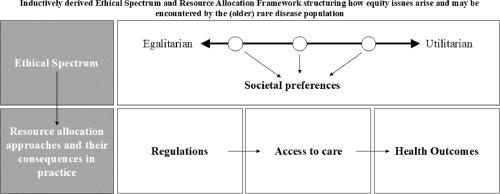Identifying health inequities faced by older adults with rare diseases: A systematic literature review and proposal for an ethical spectrum and resource allocation framework
IF 3.6
3区 医学
Q1 HEALTH CARE SCIENCES & SERVICES
引用次数: 0
Abstract
Ageism in healthcare has received increased attention in recent years, but literature focusing on how it affects individuals living with rare diseases remains scant. The rare disease population already faces obstacles when navigating health systems, and ageism has the potential to exacerbate existing health inequities. We conducted a systematic review of peer-reviewed and gray literature on health inequities in rare disease populations, seeking to identify publications that reported primary or secondary data on the equitable or inequitable treatment of these populations, or that discussed related regulatory, moral, or philosophical issues. Our aims were to understand how health inequities in these populations arise, how they are justified from societal points of view, how they manifest themselves in laws and regulations, and what effects they have on health care access and health outcomes. We retrieved information from 63 publications, which we inductively synthesized into five categories: ethical discussions, societal preferences, regulations, access to care, and health outcomes. Integrating insights from these categories, we developed an Ethical Spectrum and Resource Allocation Framework, which explains the emergence of equity issues and how they are manifested in health systems. By providing a better understanding of the root causes of health inequities, particularly among older adults, the framework can inform health policymaking, improving access to care and health outcomes for rare disease patients.

识别患有罕见疾病的老年人在健康方面面临的不平等:系统文献综述及伦理范围和资源分配框架建议。
近年来,医疗保健中的年龄歧视问题受到越来越多的关注,但关于它如何影响罕见病患者的文献仍然很少。罕见病患者在使用医疗系统时已经面临重重障碍,而年龄歧视有可能加剧现有的健康不平等。我们对有关罕见病人群健康不平等问题的同行评议文献和灰色文献进行了系统性回顾,试图找出那些报告了有关这些人群公平或不公平待遇的主要或次要数据,或讨论了相关监管、道德或哲学问题的出版物。我们的目的是了解这些人群在健康方面的不公平是如何产生的,从社会角度来看它们是如何合理的,它们是如何在法律法规中体现出来的,以及它们对医疗保健的获取和健康结果有什么影响。我们从 63 篇出版物中检索了信息,并将其归纳为五个类别:伦理讨论、社会偏好、法规、医疗服务的获取和健康结果。综合这些类别的见解,我们制定了 "伦理范围和资源分配框架",该框架解释了公平问题的出现及其在医疗系统中的表现形式。通过更好地了解健康不公平的根本原因,尤其是老年人的健康不公平,该框架可以为健康决策提供信息,改善罕见病患者获得护理的机会和健康结果。
本文章由计算机程序翻译,如有差异,请以英文原文为准。
求助全文
约1分钟内获得全文
求助全文
来源期刊

Health Policy
医学-卫生保健
CiteScore
6.40
自引率
6.10%
发文量
157
审稿时长
3-8 weeks
期刊介绍:
Health Policy is intended to be a vehicle for the exploration and discussion of health policy and health system issues and is aimed in particular at enhancing communication between health policy and system researchers, legislators, decision-makers and professionals concerned with developing, implementing, and analysing health policy, health systems and health care reforms, primarily in high-income countries outside the U.S.A.
 求助内容:
求助内容: 应助结果提醒方式:
应助结果提醒方式:


